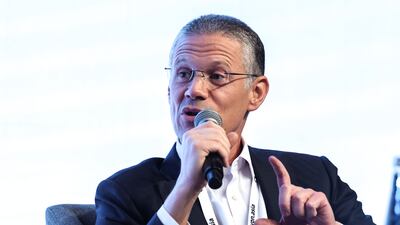Follow the latest UNGA updates here
An Emirati envoy has set out the UAE's mission to bring companies and countries together and unleash the potential of advanced technology to serve as a global hub for philanthropy.
Badr Jafar, special envoy for business and philanthropy, said the Emirates was well-positioned to act as a "trusted partner" in co-ordinating crucial international aid efforts.
Speaking to The National at the UN General Assembly in New York, Mr Jafar underlined the need to improve efficiency and transparency in charitable giving to ensure funds reach where they are needed most.
He gave the example of how hundreds of billions of dollars are donated each year through Zakat, one of the five pillars of Islam, which requires Muslims above a certain financial threshold to donate 2.5 per cent of their wealth.
"The key question is, where is that money going and how is it going?" said Mr Jafar, also chief executive of Sharjah conglomerate Crescent Enterprises.
"So are we able to develop better digital platforms to help to channel those funds in a way that's more transparent, but that ultimately leads to also greater impact?"
"I think the UAE can play a great role by connecting not just geographies, North, South, East, West, but also sectors, to come together to develop these sorts of solutions and to be a trusted partner as a convener but also as an implementer."
The envoy's remarks come at a time when the secure delivery of aid has never been more crucial, with the world grappling with the human cost of deadly conflicts in Gaza, Sudan and Ukraine.
"The UAE's real secret sauce is our ability to translate ideas into projects, initiatives and outcomes that really deliver real impact to our society, and to societies that we partner with," said Mr Jafar, who has held talks with charitable organisations and agencies during Unga to outline the UAE's vision.
"One of the things that we've been working on is the creation of a blueprint of sorts, as to what the UAE as a hub for philanthropy would look like," he told The National.
Global effort







The business and philanthropy champion said the challenges faced by the United States Agency for International Development (USAID) – which has had most of its aid programmes cut by President Donald Trump – highlighted the need for charitable partners to put on a united front.
"The shock to the system that happened when USAID was dismantled was very real," Mr Jafar said. "But when you put it in perspective, just to give you the US example, USAID at its peak delivered around $60 billion or $70 billion a year, which is a lot of money.
"Obviously those programmes that relied on it were in particular destitute when that money stopped all of a sudden. But if you look at private philanthropy in the US last year, north of $600 billion was disbursed – so 10 times the government aid.
"And this is by private, I mean actually private individuals, this is over and above corporate philanthropy or corporate social responsibility. So there's a thriving cluster in North America. There's also a significant cluster in Europe.
Mr Jafar added: "In other parts of the world it's more fragmented. They want to be more engaged in their giving. They want more transparency. They want to see better use of technology.
"And technology has the ability to move philanthropy from a one-to-many model, where one person gives to many people, to a many-to-one model, where now you have many individuals giving smaller amounts to a specific cause or one individual even.
"So the confluence of these various trends requires a trusted partner to try and bring together research and data, convening, and also education and training of best-in-class practices.
"And I think the UAE is, I believe – many others do – the UAE has a unique potential to be that hub."


